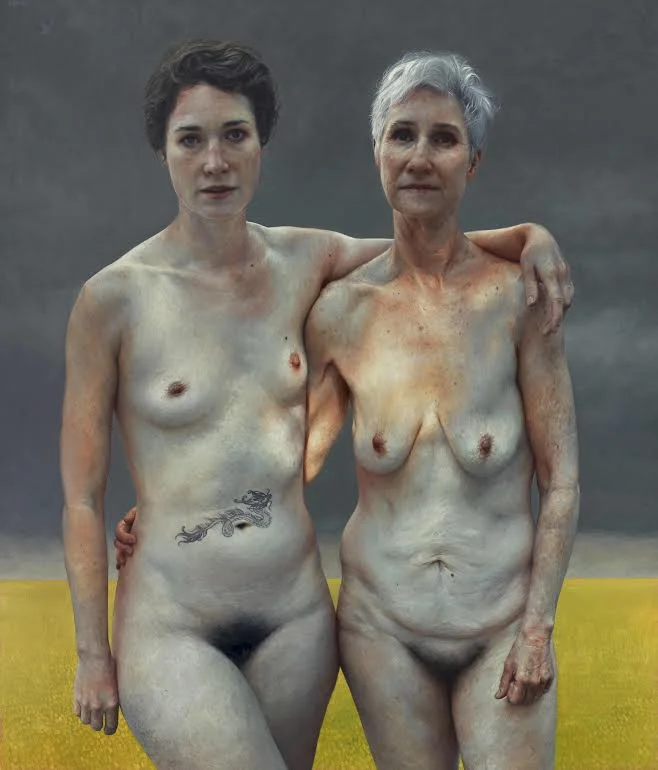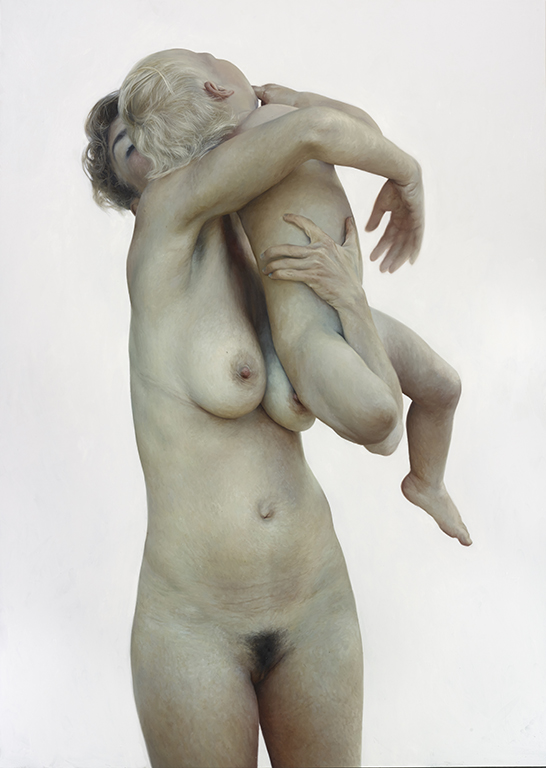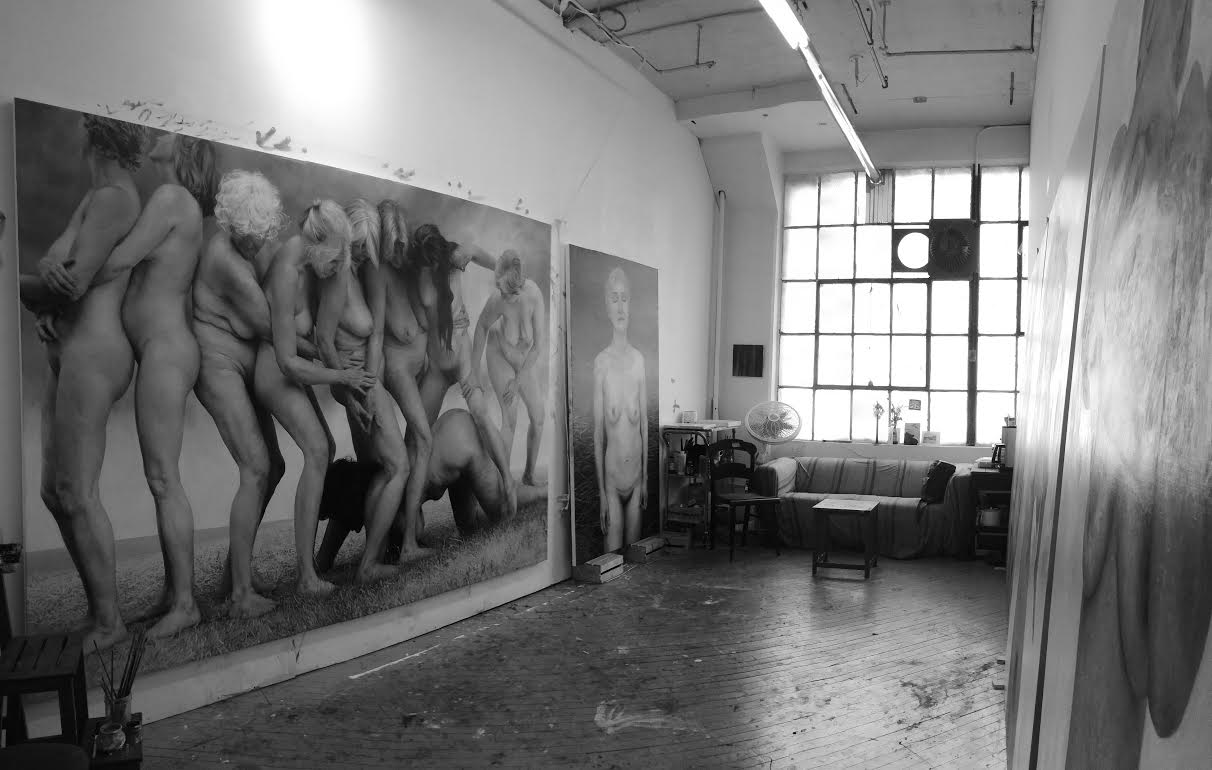I came across Aleah Chapin's work a few months back, and was moved by the life in her art. The realism, combined with her use of colouring, had a real impact on me. Aleah has been an artist since she can remember. She remembers her mother (Deborah Koff-Chapin) showing her how to draw a face, and her father teaching her how to draw a cube in 3D; and sees those experiences as the foundation of her work today. Aleah started drawing people at a young age, progressed to sculpting around 10 years of age, and painting when she was 14. Once painting, Aleah had the opportunity to use a local artist's studio (Pete Jordan), and spent a few hours weekly working there.
Aleah wanted her art to make a positive difference in the world, but that lead to a lack of direction in her work. She struggled a while to find her voice. While in graduate school at the New York Academy of Art, she realized that she just needed to use her own voice to talk about things she knew - she could definitely add value to the conversation in that way. And, what value she has added. She decided to start her Aunties Project, which has grown to an even larger project, including more and more women. It has shown her "the power of a simple image, the strength of vulnerability and the connectedness of individualism."
What does Creativity mean to you?
Going into that place where I can ask questions that I don't know the answer to. Creativity is an illusive, terrifying, and beautiful thing that works best when you are open to where it can take you.
How do you expand yourself creatively?
Putting myself in situations that I don't know exactly what to do and realizing that being scared and unsure often means there is something exciting and new happening.
Embody Your Muse - Aleah Chapin - "Lucy"
What inspires you most?
People. I have always felt an intense pull towards seeing those little things that make us individual.
Do you have any gratefulness practices?
Not necessarily a practice, but I do try to be conscious and aware of how lucky I am to have had support from my family and that I get to do what I love every day.
How do you care for yourself to ensure you’re available when ideas present themselves?
I just try and stay open. It's probably going to be a lifelong lesson and struggle, but it's really important. The other thing is finding balance between pushing and resting. I know it's important to go to the studio every day, even when I don't feel inspired, to provide space to grab onto that elusive thing when it comes. But it's just as important to leave the studio, give the paintings a rest and live a little.
How do you balance life and art effectively? Or, do you?
This is something I'm learning. I used to believe that it wasn't about balance, but more about spending every waking moment in the studio. I used to feel guilty if I wasn't working. But I'm realizing how important it is to live and have relationships. These things feed the work just as much as being in the studio. So in a practical sense, I set basic work hours for myself and try to stick to them. But I also let myself relax and let go when life asks me to.
Embody Your Muse - Aleah Chapin - "Jumanji and Gwen"
How do you deal with creative dry spells? Do you make space for them, or push through?
They are so tough. Most of the time they take just pushing through, embracing the difficulties and not fighting them. Ultimately, just knowing that they are part of this life and they can lead to really exciting things that you would never have discovered otherwise.
How does criticism affect you?
First it hurts. Then it helps me grow. It depends on the critique, but often it teaches me something I really needed to know, and other times it gives me the strength to keep going. (see this interview I did about rejection: http://susanmulder.com/rejection-chonicles-aleah-chapin/)
How important is self compassion to your creative process?
Very important, but equally important is self criticism. I think we need both, and either can become overbearing and creativity crippling.
Do you enjoy collaborating, or prefer to work alone?
I usually like to work alone, but I have collaborated a little and really loved it. This piece "Our Minds As We Lose" was a collaboration with artist Nic Holiber. I had done this painting and it just didn't feel finished, but I didn't know what to do to complete it. So I gave it to my friend Nic and I think he made it a pretty fantastic piece. I also see my paintings as a collaboration between myself and the person I am painting. I could never do it without them. I have the paint and brush, but they bring the personality and energy.
Embody Your Muse - Aleah Chapin - "Our Minds As We Lose"
Do you work in a studio/space designed specifically for your creativity, or on the spur of the moment/anywhere inspiration strikes?
Because of the scale of my paintings I am limited on where I can work on them. But I love this. It's really wonderful to have a space of my own that is dedicated to painting.
Is it important for you to have a creative, inspiring environment?
The environment is important, but pretty simple: even light, inspiring music or audio-book, and a good cup of coffee.
Do you plan thoroughly for projects, or go with the flow?
I plan a little, but I like to leave a lot open. I've found that I can learn so much from one piece that it will inform the next. And in terms of a single painting, I need a certain amount of excitement to complete a piece, so I try not to plan things too rigidly so that I can ride that first wave of inspiration as far as it will take me.
Do you utilize social media? If so, how?
Yes. As much as I dislike being attached to the computer, I think it is an incredible tool to get your work out in the world and connect with inspiring people. I think it's so easy to get pulled into our online "image" of ourselves that we can lose track of what really matters; the work itself. So I try to keep a balance.
Embody Your Muse - Aleah Chapin - "Lucy and Laszlo"
Do you have any rituals that help to set your creative time and/or space?
When I first get to my studio I clean up a bit, if I haven't done it the night before. I make coffee and set up my palette, then stand in front of the painting to see what area of the canvas is calling me to work on it that day.
Do you believe that connecting with your creativity, or helping others to do so, can positively affect the world? If so, how?
Visual language is really powerful and can stay with us for a long time. It also goes beyond words, and so in a certain way it can translate an idea, or perhaps more a 'sense' in a very pure way. I think when done right, art and the act of being creative does not dictate how one should think, but opens up the individual to ask their own questions or see their world in a slightly different way. Who knows how this can affect us and the choices we make on a day to day level.
Are you active in your local art community? If so, how do you help and support each other?
I try to be as active as I can. I go to exhibitions of friends work and we visit each others studios. I think this is really important.
What effect do you want your art to have on the world?
I want people to feel connected; to see their own individuality while also seeing what makes us all so alike.
Embody Your Muse - Aleah Chapin - "Shanti and Heather"
What is the best advice you’ve been given?
Don't force big ideas or concepts purely because they are big and important. Make work from what you know and care about.
Do you have any advice for aspiring creatives?
The only voice you have is your own.
Where can we find your art?
Embody Your Muse - Aleah Chapin - "It Was The Sound Of Their Feet" and "Gwen"






